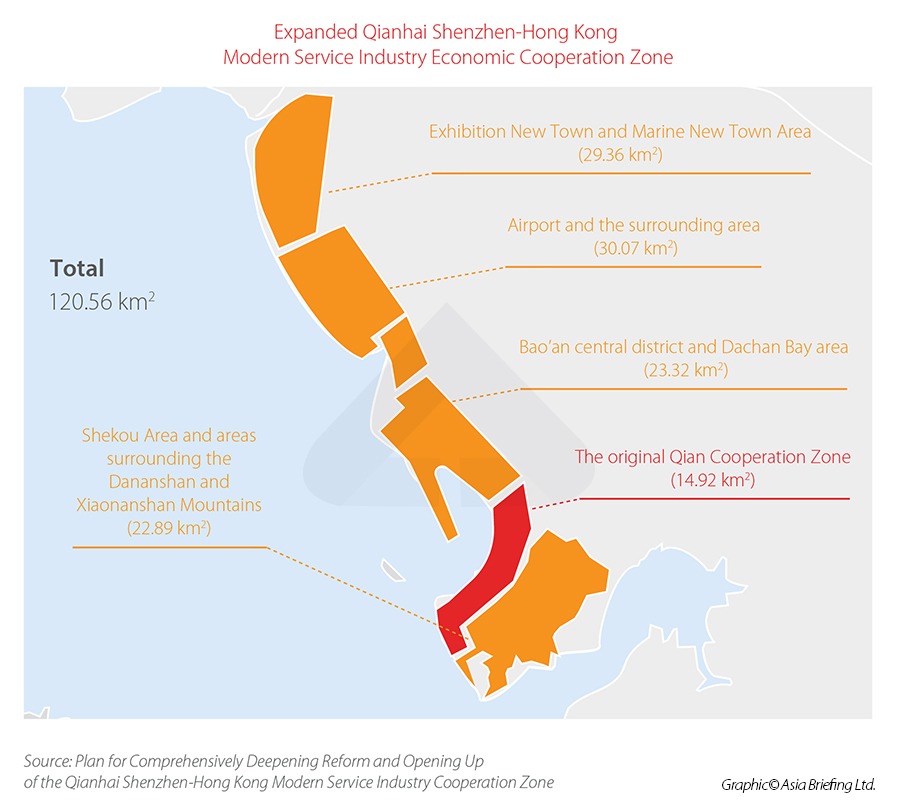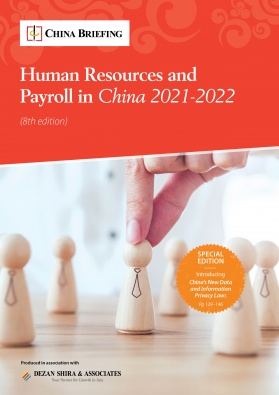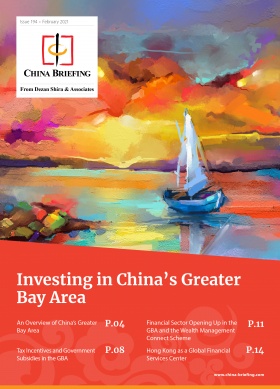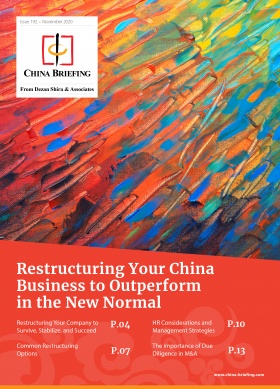China to Expand Qianhai Cooperation Zone: Detailed Aims
Qianhai Cooperation Zone is an experimental business zone to facilitate financial, logistics, and IT services activity between Mainland China and Hong Kong. Area under the Qianhai Cooperation Zone is set to increase from 15 sq km to 120 sq km and will be located in the Shekou Area of the Guangdong FTZ. The zone will also assist in further integrating Hong Kong and Macao’s economies with the Greater Bay Area.
On September 6, 2021, the same day Hong Kong Chief Executive Carrie Lam visited Shenzhen, China announced an expansion of the Qianhai Shenzhen-Hong Kong Modern Service Industry Economic Cooperation Zone (hereinafter, Qianhai Cooperation Zone).
Officially approved by China’s State Council back in August 26, 2010, the Qianhai Cooperation Zone was established with the aim of serving as an experimental business zone for improved interaction between Mainland China and Hong Kong in the financial, logistics, and IT services sectors.
After the recent expansion, the area encompassing Qianhai Cooperation Zone will increase by eight times from 15 sq km to 120 sq km. The newly expanded Qianhai Cooperation Zone covers the Shekou Area of the Guangdong Free Trade Zone.
The expansion plan aims to further integrate Hong Kong and Macao’s economies into the Greater Bay Area, which is made up of nine cities in the Pearl River Delta (Shenzhen, Guangzhou, Foshan, Dongguan, Zhuhai, Zhongshan, Huizhou, Zhaoqing, and Jiangmen) and two administrative regions (Hong Kong and Macao). The Plan for Comprehensively Deepening Reform and Opening Up of the Qianhai Shenzhen-Hong Kong Modern Service Industry Cooperation Zone (hereinafter, the Qianhai Plan) was promulgated on September 7, 2021.
“The promulgation of the Qianhai Plan will foster Hong Kong-Shenzhen co-operation at a higher level under which the two cities can serve as ‘dual engines’ to drive development in the Greater Bay Area,” Carrie Lam stated in a Hong Kong government press release. The expansion will allow for a bigger “stage” for the city to excel and to increase opportunities for young people.
Furthermore, the Qianhai Plan demands the zone liberalize services trade and open the financial sector further, including through supporting links to Hong Kong’s financial market, allowing for cross-border renminbi use, allowing for more convenient management of foreign exchange, and supporting cross-border security investments further. The Chinese government hopes that by 2025, the development should help to foster a “higher-level open economic system” and by 2035, the area should have a world class business environment.
Analysts believe that finance, education, technology, law, and medicine professionals in Hong Kong are the most likely to benefit from the expansion. Hong Kong’s financial hub status will receive a major boost with the expansion, cementing closer business and technology relationships.
What are the details of the Qianhai Plan?
The government in China has set out a detailed plan to improve the Qianhai Cooperation Zone in relation to the area’s services sector innovation, technology development, business environment, administrative management, free trade, finance opening up, legal opening up, and international cooperation.
Innovative development of the modern services sector
Firstly, the government aims to promote the development of the modern service industries. Among others, the Qianhai Plan emphasizes the following points:
- Develop standards for modern service industries and carry out trials and demonstrations for standardization.
- Jointly build combined ports for international trade and implement land, sea, and air multimodal transport and hub linkage.
- Foster financial businesses that serve the real economy and promote innovations in financial markets, institutions, services, and products.
- Accelerate the development of green and smart supply chains and establish supply chain standards in line with international standards.
- Standardize the development of offshore trade.
- Explore and study the reform of international ship registration and supporting systems.
- Promote the integrated development of modern services and manufacturing, and accelerate the development of new technologies, new forms, and new models of services, such as Internet Plus and artificial intelligence.
Technology innovation
The Qianhai Plan focuses on areas in which Hong Kong and Macao are strong, such as artificial intelligence, healthcare, fintech, smart cities, the Internet of things, and new energy materials, targeting the development of new types of R&D institutions for cooperation between Guangdong, Hong Kong, and Macao and promoting synergy and connectivity between the innovation chains of Hong Kong, Macao, and the mainland.
Talent base
The Qianhai Plan also sets to build a high-end innovation talent base by coordinating science and technology infrastructure in neighboring areas and improving supporting measures for attracting talents.
Moreover, the Qianhai Plan indicates the Qianhai Cooperation Zone will actively introduce venture capital institutions, science and technology funds, and research and development institutions and will work with Hong Kong and Macao to explore new legal rules and international economic and trade rules conducive to the development of new technologies and industries and promote law-based and standardized development within the zone.
Marine base
In addition, the Qianhai Cooperation Zone has plans to gather international marine innovation institutions, vigorously develop marine science and technology, speed up the construction of the modern marine services cluster area, and build a highland of marine science and technology innovation featuring high-end marine intelligent equipment, marine engineering equipment, marine electronic information (big data), marine new energy, and marine ecological and environmental protection.
Intellectual property
Qianhai Cooperation Zone will build an ecosystem for the creation, protection, and application of intellectual property rights.
Competitive business environment
The Chinese government intends to create a world class environment for businesses in the Qianhai Cooperation Zone. The Qianhai Cooperation Zone will study and develop investor protection regulations within the area to better protect the interests and rights of foreign private capital and businesses. There are plans to reform some of the regional state-owned enterprises and build a more competitive framework for businesses.
Besides, the Qianhai Plan also mentions that the Qianhai Cooperation Zone will explore ways to reduce market access restrictions on internet convergence products and services, create credit economy pilot zones, and facilitate cross-border government services with Hong Kong and Macao.
To attract talents, the Qianhai Cooperation Zone will facilitate young people from Hong Kong and Macao to study, work, reside, live, start businesses, and find jobs in the zone, support high-level hospitals from Hong Kong, Macao, and the world in setting up offices in the zone, and facilitate the application of visas, residence certificates and permanent residence certificates for foreign talents.
Liberalization of trade in services with Hong Kong and Macao
The Qianhai Plan proposes to further deepen service trade liberalization and to expand Qianhai’s service areas to Macao and Hong Kong under the framework or the CEPA (Closer Economic and Trade Relations Arrangement).
The Qianhai Cooperation Zone will deepen the synergy with Hong Kong and Macao rules in the fields of vocational qualifications, service standards, certification and accreditation, inspection and testing, and industry management in the service sector.
The Qianhai Cooperation Zone will also cooperate with Hong Kong on cooperative education, concentrated development of medical institutions, and entry-exit of yachts from Hong Kong and Macao.
Financial opening up
The Qianhai Cooperation Zone will act as a demonstration window of the opening up of the financial industry in China and will serve as a renminbi innovation pilot zone. A pilot program is due to run to combine foreign and domestic bank accounts, which provide players in the market with safe and more efficient services. Qualified financial institutions will receive help to carry out cross-border security businesses.
In addition, cooperation on international insurance institutions, green finance, new mechanisms for cross-border payment, and clearing will be promoted in the Qianhai Cooperation Zone, and the Qianhai Joint Trading Center of the Hong Kong Stock Exchange will conduct spot trading of bulk commodities.
Legal opening up
An international legal service center and an international commercial dispute resolution center will be set up in the Qianhai Cooperation Zone to explore the convergence of different legal systems and cross-border legal rules. Among others, the below measures are mentioned in the Plan:
- To explore and improve the mechanism for applying Hong Kong laws to the Qianhai Cooperation Zone and choosing Hong Kong as the place of arbitration to settle civil and commercial cases.
- To explore the establishment of a new mechanism for judicial assistance and exchanges in civil and commercial matters between the Qianhai Cooperation Zone and Hong Kong and Macao.
- To support and encourage foreign and Hong Kong and Macao law firms to set up representative offices in the Zone.
- To support Qianhai Courts in exploring ways to expand the scope of accepting foreign-related commercial cases and support legal experts from Hong Kong to appear in Qianhai courts to provide legal assistance.
- To build an inter-regional commercial dispute settlement platform.
- To allow well-known overseas arbitration and other dispute resolution institutions to register with the judicial administration department of the Guangdong Provincial Government and set up business offices in Qianhai Cooperation Zone to conduct arbitration on civil and commercial disputes arising from foreign-related commercial affairs, maritime affairs, investment, and other fields.
- To explore international investment arbitration and mediation in the Qianhai Cooperation Zone.
High-level international cooperation
The Qianhai Plan proposes to make full use of Hong Kong’s professional services that are in line with international standards and support enterprises in Qianhai Cooperation Zone to “go global”.
The Qianhai Cooperation Zone is encouraged to cooperate with international port and free trade zones on cross-border trade facilitations. International organizations of economy, science and technology, standards, talents, and think tanks are explicitly being supported in the zone. The Shenzhen Airport and the Shenzhen International Exhibition Center are encouraged to play active role in international cooperation.
Summary
The expansion of the Qianhai Cooperation Zone will not only be geographically bigger but is expected to come with a wave of new initiatives and innovation. The intention is to create a world class business environment whereby businesses located in the zone can compete globally.
The current Qianhai Plan is more like a guideline and lacks implementation details, but businesses can expect to see more supporting measures being put in place, as in the case of other economic zones. Staying on top of these updates will be necessary to understand the real and potential opportunities and business protections, while the talents seeking to work, live, or study within the Qianhai Cooperation Zone should expect more clarity on available opportunities and supportive measures.
About Us
China Briefing is written and produced by Dezan Shira & Associates. The practice assists foreign investors into China and has done so since 1992 through offices in Beijing, Tianjin, Dalian, Qingdao, Shanghai, Hangzhou, Ningbo, Suzhou, Guangzhou, Dongguan, Zhongshan, Shenzhen, and Hong Kong. Please contact the firm for assistance in China at china@dezshira.com.
Dezan Shira & Associates has offices in Vietnam, Indonesia, Singapore, United States, Germany, Italy, India, and Russia, in addition to our trade research facilities along the Belt & Road Initiative. We also have partner firms assisting foreign investors in The Philippines, Malaysia, Thailand, Bangladesh.
- Previous Article Wie Sie Ihre Zulieferer in China begutachten können: Wichtige Aspekte und Fallbeispiele
- Next Article La Nuova Strategia dell’UE sulla Cina: Che cosa implica per le Imprese







